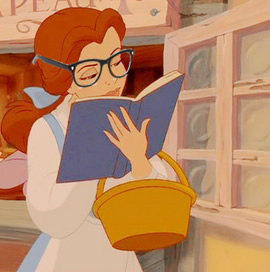The Strange Case Of Nicheolas Bartleby
(This script could easily be animated, with stellar voice acting and excellent costume work for cute bears, frogs, or perhaps dodo birds, all in a pastel coffee-shop setting. But it turns out those cost money. By contrast, your own imagination is free. Use it accordingly.)

A most peculiar mademoiselle. She loves Christian speculative stories, but doesn’t share them with others or partner with existing readers.
Fredly: Hello, good to see you here. How are you doing?
Nicheolas: Um. Hi. I am fine.
Fredly: Pardon my intrusion, but I couldn’t help but notice you reading that novel. I love that novel.
Nicheolas: Um. What?
Fredly: I said I love that novel. I’ve read it twice since it released last year.
Nicheolas: You do? You did?
Fredly: Yes. I particularly enjoy how the author skillfully explores man’s sinful nature versus the imago Dei that reflects his Creator. I’ll never think of Genesis 2 in the same way again. The story and characters made me ponder for days. Such a beautiful work.
Nicheolas: Oh. Well, I liked it because it was fun.
Fredly: Yes. It was fun. But better than that. I haven’t felt that kind of joy from many books.
Nicheolas: What do you mean by “joy”?
Fredly: I mean an awareness of God’s beauty, goodness and truth in a story that makes me want to worship Him more. It’s the kind of happiness that comes with knowing Him. It comes from His true Story in the Bible, and also our stories, whether they’re real or made up. As C.S. Lewis said in his final Chronicle of Narnia, The Last Battle, “There is a kind of happiness and wonder that makes you serious. It is too good to waste on jokes.”
Nicheolas: Yeah. Well, I just liked it because it was “weird.” I love “weirdness” for its own sake. It also showed real life. The characters weren’t perfect and not everything ended perfectly. I wish there were more novels like this that don’t hide life’s nastiness.
Fredly: But there are more novels like that.
Nicheolas: Really?
Fredly: Yes. You can find them on the internet. Many authors and websites already have that very purpose. Even better, you can talk with friends who love the same kinds of novels. Several of my friends at church could —
Nicheolas: I’m writing a book. Would you like to hear about it?
Fredly: What’s it about?
Nicheolas: It’s about a poor orphan who discovers that actually he is the lost son of the king and must defeat a fantasy world’s villain according to ancient prophecy. He can talk to animals, too. And he has a magic sword. If you’ll wait a moment, I’ll go out and retrieve my boxes of notebooks. They fill the trunk of my car.
Fredly: Well. That sounds interesting. Have you looked at other books that are already published?
Nicheolas: Yes, I think. I was reading this one book that brought you here. In fact, that’s another reason I liked it. It gave me so many ideas for my own book. It’s an inspiration.
Fredly: I thought you said you liked it because it was fun.
Nicheolas: What?
Fredly: Well, you said it was entertaining to you. It sounds more like you’re bringing your work into it. Before you can write a book, shouldn’t you try to enjoy another person’s story for its own merits?
Nicheolas: Do you want to read my book? We could form a writing group.
Fredly: I think I have read a book like that. Or a few of them. But I was about to ask if you wanted to join a reading group at my church. We’re going through a classic fantasy written by a famous Christian author that redefined the genre, entertains, and moves us to worship.
Nicheolas: I don’t know. I stay pretty busy.

And he absolutely hates being the only one.
Fredly: At what church are you a member?
Nicheolas: No one else at my church likes fantasy. I’m the only one.
Fredly: What do your friends say about the novels you love?
Nicheolas: I don’t talk about them. No one there likes fantasy.
Fredly: Then how do you know? Yes, many Christians dislike fantasy and speculative stories for wrong reasons. But sometimes we can blow that problem out of proportion.
Nicheolas: I think that when publishers find out what an amazing writer I am and my book is published, with a dazzling cover and movie rights fought over by Stephen Spielberg, James Cameron, Peter Jackson, and Michael Bay, then Christians will wake up to fantasy.
Fredly: I think maybe they already are. Now I begin to wonder who’s really asleep.
Nicheolas: By the way, I’ve been thinking of starting a website about stories like this one. I haven’t seen anything like that now, even though I searched the entire world-wide web.
Fredly: The internet already has dozens of such websites. Maybe even thousands. They have author interviews, podcasts, book reviews, and everything.
Nicheolas: I think I will start a website like that myself. I’ll do what no one is doing.
Fredly: People are already doing this. Why not join with them?
Nicheolas: I would prefer not to.
Fredly: That makes no sense at all. You seem to want to be a lone hero.
Nicheolas: I think the best stories are about lone heroes.
Fredly: Not in real life, and not in many great stories I’ve seen.
Nicheolas: Do you want to read my book, or not?
Fredly: Sorry. I do not want to interfere with someone’s lone-hero mythology. Have a niche day.







































I think this story has a moral, or something, but I can’t decide where. I liked it because, like, it was fun and stuff. And the characters were different. And, like, it doesn’t hide the nastiness of readers.
😀
Nicheolas: self-absorbed, much?
Haaa. I have to admit, I don’t think I really found any other fantasy-fans at church until I went off to college, but I’m not sure exactly why. Maybe because I felt like I should be talking church stuff, or maybe school stuff, at church.
Love it, Stephen! I never thought before that the “niche mindset” might actually be why SFF fans don’t spread the word about the books they love.
How much easier is it to write our own book than to read and support others. 😉 Of course, I’m writing my own, but after years of laboring in the industry–or, should I say, outside the industry–I realize how important it is to be up on what is current.
I’m always surprised to read criticism of Christian fiction or specifically of Christian speculative fiction from someone who admittedly doesn’t read it! Or bloggers who can’t find review sites or CSFF titles. It makes me wonder just how interested in the genre they really are.
Becky
Funny post. Thanks. I try to read in my genre. Which has not been Christian fantasy lately. But I also try to keep up on children’s Christian fantasy. I don’t necessarily do a great job at it. Thanks for the reminder.
This in in response to why church members may not want to hear about fantasy books. By the way, love the post!
We need to stop trying to talk outside of the church paradigm in church. “Church folks will not ever get it. The artsy, creative, deep thinkers are the ones who are not tied down to buildings and a pastor. I know this because my husband and I tried talking about creative writing/reading and the church wanted our writings to be “churchy” before it was called “acceptable”- we should have known better.
Just know that there are readers of fantasy/spec fic out there who appreciate writers and other readers like ourselves. Blogs like this is what starts the conversation on these matters.
Thanks!
This dialogue is hilarious. Scarily hilarious, because it hits pretty close to home. One of the reasons I try to avoid talking about my own unpublished writing (which continuously consumes large swaths of my thought-life) is ’cause I know I’d start coming across like Nicheolas.
I think the tendency of Christian fantasy fans to isolate themselves might not be unrelated to the tendency among modern Christians to abandon congregational assemblage. It seems like the root of such self-cloisterment might be nothing more than an unwillingness to associate with those of a slightly different background or mindset for fear of being judged, inconvenienced, or made uncomfortable. More terrifying is the prospect that these loners actually believe themselves to be literarily superior to the rest of the world, without need of guidance or, at the very least, companionship. I may be perpetuating the stereotype of the self-absorbed critic here, but I haven’t read many offerings from independent Christian speculative authors that were actually worth my time. Integration into the larger community of writers and readers can help raise the standards of writers without lowering their standards as readers.